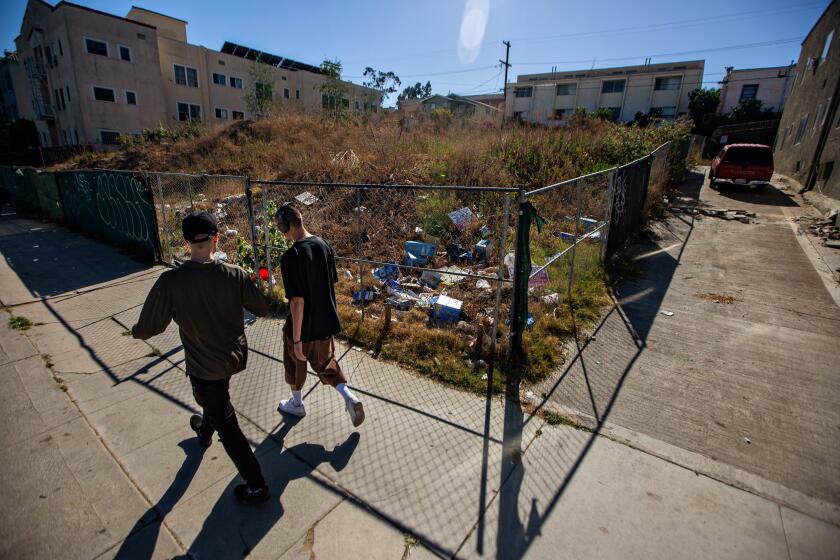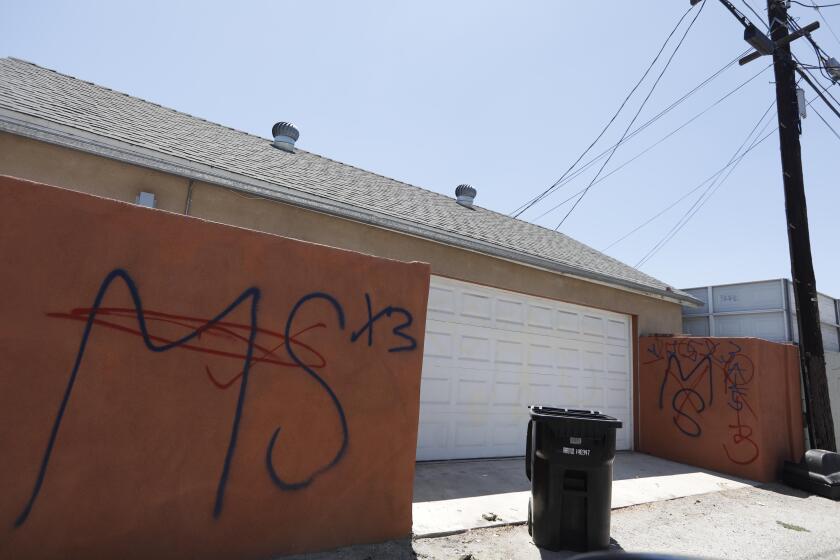Attacks on transgender women expose MS-13 gangâs grip on MacArthur Park
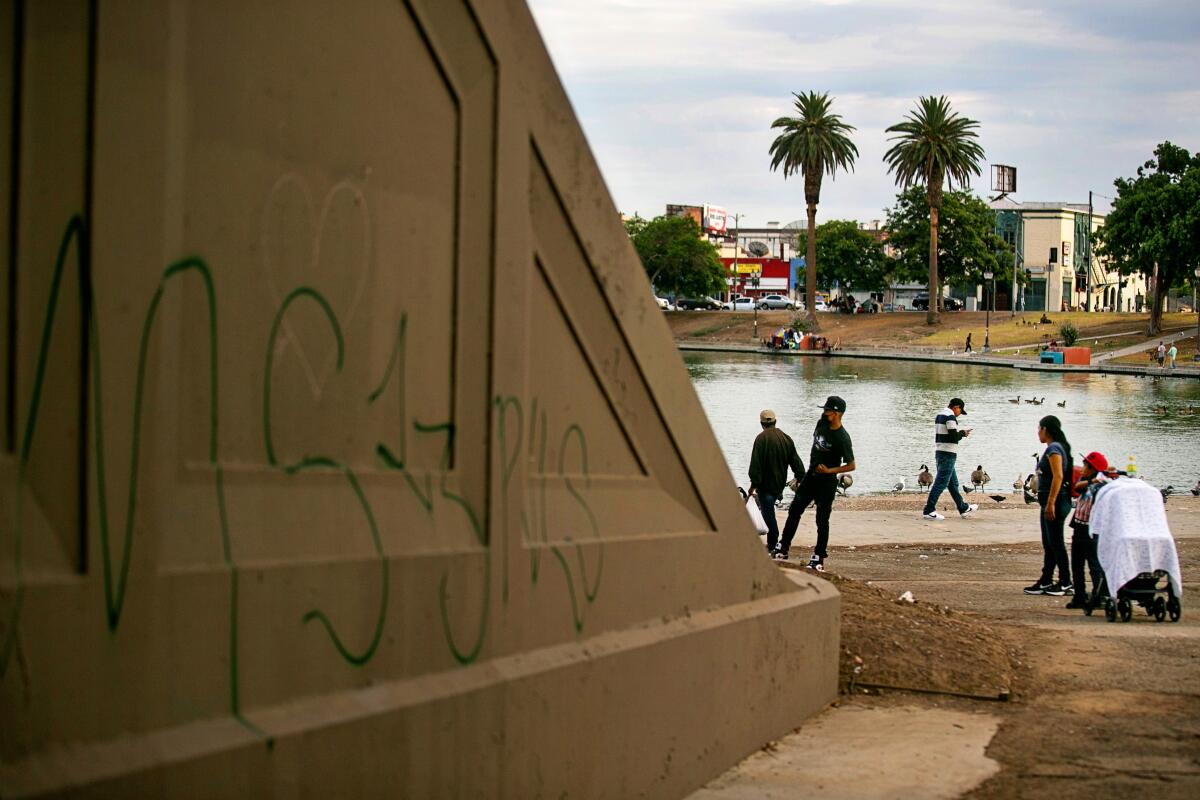
Night settled on a woman sitting alone on a bench in MacArthur Park.
Three people moved toward her. One locked an arm around the womanâs throat as the others pulled out knives and began to stab her.
The attack in October marked the second time in weeks that a transgender woman had been stabbed nearly to death in the Los Angeles park by members of MS-13, a street gang that considers the park the heart of its territory.
The vicious assaults drew condemnation from advocacy groups and a heavy police presence to the park as a straightforward narrative emerged: MS-13 had been motivated by a hateful, bigoted desire to rid its turf of transgender people. Left unmentioned, however, were the tangled underworld economics that brought the women and the gang into contact in the first place.
The women had been paying members of MS-13 a weekly fee â âtaxesâ in the gangâs words â simply for permission to be in the park, according to police reports and interviews with victims and the police. They were among the street vendors, drug dealers, sex workers, shopkeepers and others who every day must pay for a commodity those in more affluent neighborhoods do not even know exists â the right to be left alone by a gang.
The Times reviewed search warrant affidavits, police reports and other records filed in court and interviewed police officers and victims of MS-13. What emerged was a portrait of a gang that acts as a shadow authority in MacArthur Park and other parts of the city it considers its turf, deciding in some cases who is permitted in public spaces and who can engage in commerce, legitimate and illicit.
For decades, gangs have exacted ârentâ from vendors and drug dealers in MacArthur Park. Periodic violence has spotlighted the shadow taxation system, such as when 18th Street gang members opened fire on a man who had refused to pay $50 for permission to sell radios on the sidewalk of 6th Street. The gunfire struck a 3-week-old baby, killing him.
The recent attacks by MS-13 demonstrate that despite a transformation marked by rising rents and a growing number of luxury apartments, restaurants and other amenities just west of the park, gangs continue to hold the poorest and most marginalized of the people who live and work in the neighborhood in their grip.
Subscribers get early access to this story
Weâre offering L.A. Times subscribers first access to our best journalism. Thank you for your support.
Those beholden to the gangâs authority are those least equipped to resist it. Whether because they are living in the country illegally, operating in the underground economy, or have seen the violence directed at those who defy the gang, rarely do they look to the police for help.
âTheyâd rather pay the tax than have to look over their shoulder,â said Officer Daniel Cardenas, who monitors MS-13 as part of a gang detail in the Los Angeles Police Departmentâs Rampart Division. âThey still have to live here.â
*
At the center of MS-13âs territory, at the heart of its identity, is MacArthur Park. Thirty-five acres of grass, water and palm trees, the park is a worn oasis in an otherwise unbroken expanse of aging high-rises and choked streets just west of downtown Los Angeles.
It is a place where tenants in one of the most crowded neighborhoods in the country can find relief from cramped apartments that are often divided among multiple families. People can take a walk around the man-made pond at dusk after work, buy something to eat from the vendors that crowd the sidewalks, join a game of pickup soccer or throw some dice at night on the concrete paths that wend through the park.
In every direction, though, are the spray-painted reminders of the gangs that lay claim to MacArthur Park. âMS X3 PVLSâ covers sidewalks, bathrooms and tree trunks in the parkâs western half, the territory of MS-13âs Park View Locos clique. In the northeast corner, 18th Streetâs Columbia Lilâ Cycos clique paints âXVIII,â â18 STâ and âCLCS.â The Crazy Riders leave their âCRSâ tag across the southeast corner.
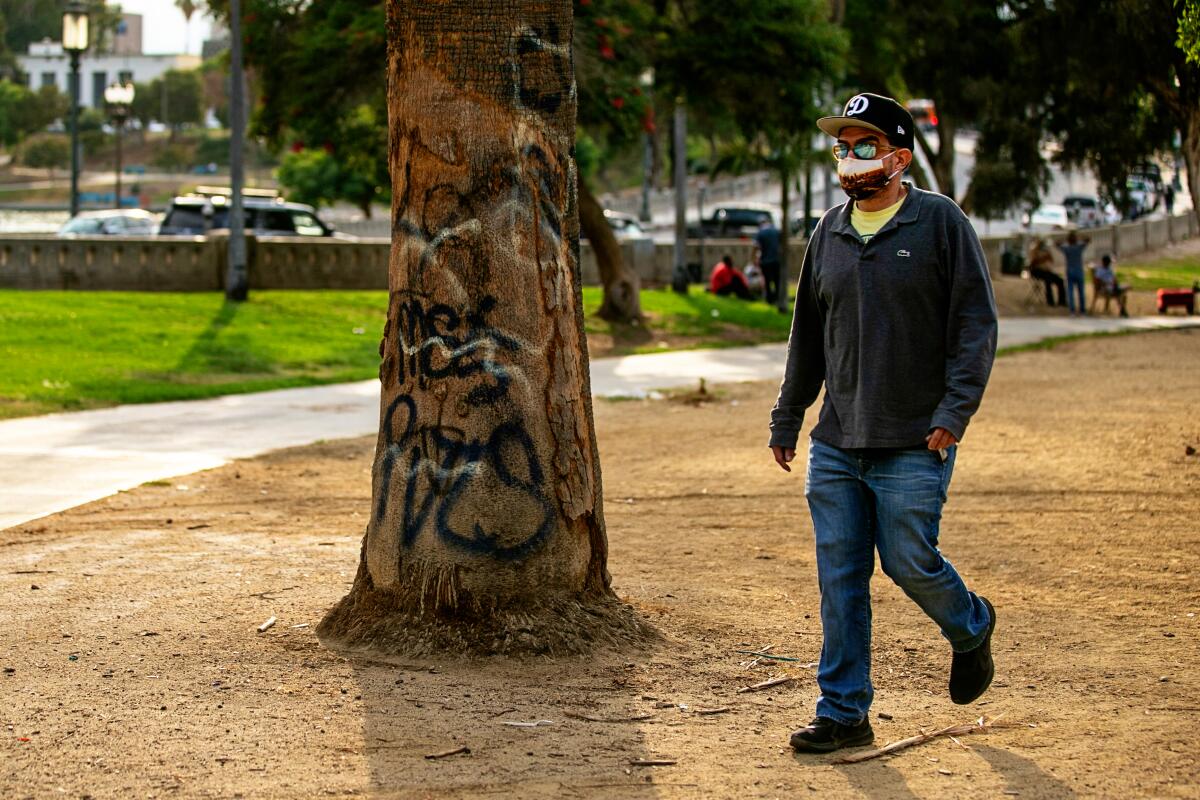
MS-13 was born four decades ago in the neighborhoods surrounding MacArthur Park â places such as Westlake, Rampart and Pico-Union â where thousands of Salvadorans settled after fleeing a civil war that racked their homeland. Today MS-13 has cliques, or subsets, throughout the U.S. and Central America, but MacArthur Park is still considered its âMecca,â said Cardenas, the Rampart gang officer.
Poor and often untethered to family, some members of the gang live in the tents that have been pitched in ever-growing numbers within the park, a detective wrote in seeking a warrant to search one of them. Others stay in nearby encampments, in abandoned buildings called âdestroyers,â or in the apartments that circle the park.
Three people were slain within the blighted rooms of the MS-13 destroyer on Rampart Boulevard in 2017 and 2018, authorities said.
To MS-13, MacArthur Park is not just a territory but a source of revenue. The gang tries its best, police say, to collect a percentage of everything sold inside it: drugs, food, gambling, sex. According to one homeless services provider in the area, the gang has even begun demanding rent from people living in the park.
The gangâs view of the park as a financial wellspring was captured in a conversation intercepted by the authorities in 2018. An incarcerated MS-13 member dialed Dennis Barrera-Palma, who authorities say led an MS-13 clique in Mendota, a city of about 11,000 people in Fresno County.
Barrera-Palma, known as âGunner,â was trying to regain MS-13âs grip on MacArthur Park after the LAPD arrested high-ranking members of the gang in 2015, an agent wrote in an affidavit seeking to continue tapping Barrera-Palmaâs cellphone. His attorney didnât return a call seeking comment.
The inmate, Eric Gutierrez, suggested that Barrera-Palma start âimplementing some rentâ at MacArthur Park, according to the affidavit. He recalled how when he was on the streets of Los Angeles, he would go to the park at 7 a.m. and collect $300 by 9 a.m., the agent wrote. While âsome guys had to do it the hard way,â Gutierrez boasted that he ânever would have to ask the people, the people would come on their own.â He suggested Barrera-Palma start by charging âjust a little bitâ â âlike 50 bucksâ â so that he could collect the money âwithout having to chase people.â
While the gang mainly targets drug dealers, gamblers, peddlers of phony documents and others toiling in the parkâs black market, it also shakes down legitimate street vendors and owners of small shops and restaurants, who know that refusing to pay would risk seeing their property vandalized or their customers driven off. Many extortion victims are immigrants from Central America, where paying ârentâ to gangs is accepted as a cost of doing business, said LAPD Officer Christabel Youssef, who works a Rampart gang unit.
Federal prosecutors expanded a case against the MS-13 gang, securing an indictment that charges nine new defendants and implicates the gang in four murders.
The gang typically doesnât demand large sums of money. âIf I tax someone $10 a week, itâs a small amountâ to the victim, said Lt. Michael Ling, who oversees Rampart gang officers. âBut if youâre taxing 100 people $10 a week, you see it starts to add up.â

The demands are backed by violence. Jesus Mireles was a homeless, small-time dealer selling methamphetamine and living in MacArthur Park when he stopped paying ârentâ to the gang in 2017. Barrera-Palma dispatched a crew of underlings, telling an MS-13 member in Los Angeles he was âsending down the wolves,â prosecutors wrote in a sentencing memorandum.
Five minutes after midnight on June 11, 2017, someone wearing a hooded sweatshirt walked up to Mireles and shot him in the head, according to court papers and a coronerâs report. Doctors pronounced the 48-year-old man brain dead three days later.
Barrera-Palma and four others have been charged in Fresno County Superior Court with conspiring to murder Mireles. They have pleaded not guilty.
*
One Saturday evening last April, a young man and a woman approached Daniela Hernandez in MacArthur Park. The man introduced himself as âGolden,â the woman, as âLa Inquieta.â The Restless.
As members of MS-13, they âruled the park,â Hernandez recalled one of them saying.
A native of El Salvador, Hernandez knew MS-13âs reputation for violence and bigotry directed at transgender people like herself. But in Los Angeles, in a city of such âsecurity and opportunity,â she never thought the gang could threaten her.
Now, here were two of its members saying that if she wanted to spend any time in MacArthur Park, she would have to pay an $80 âfeeâ each week.
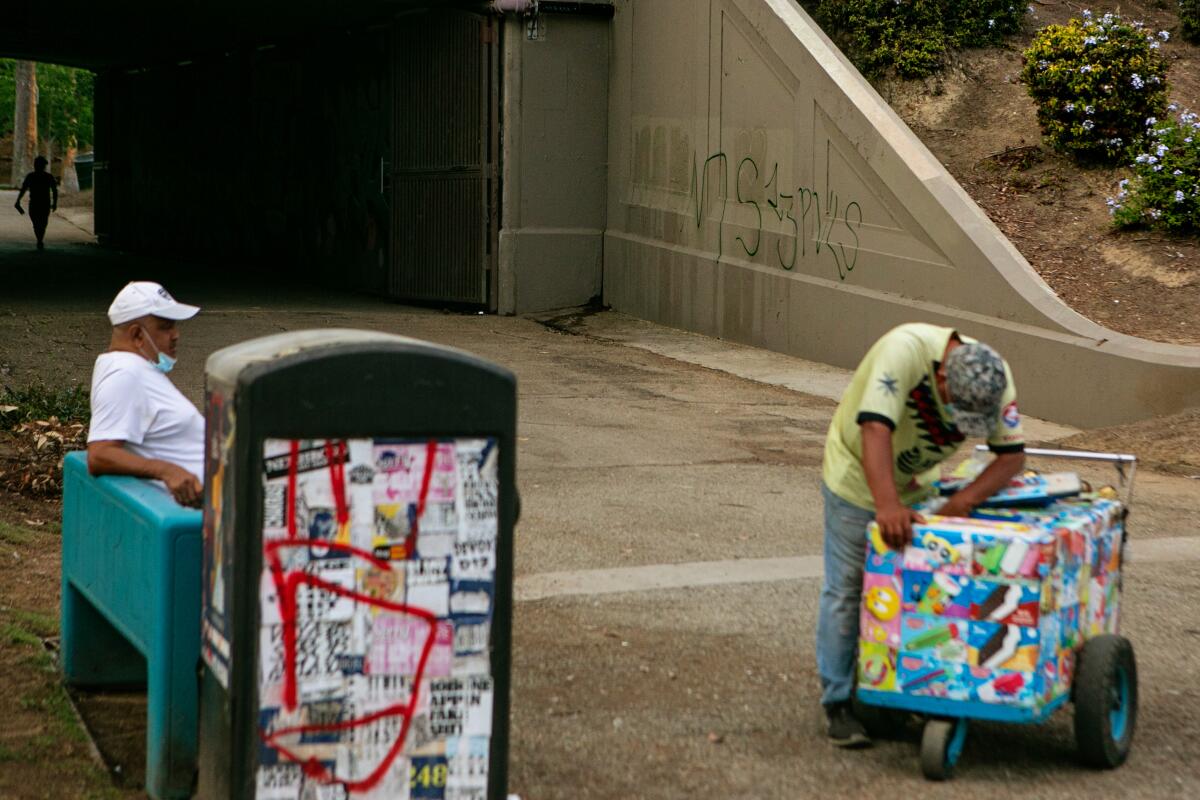
She protested, saying she couldnât pay more than $20. Golden and La Inquieta agreed to the sum, she said, but told her she would have to pay it every week, regardless of whether she went to the park or not.
Hernandez said she believes the pair singled her out for extortion in the belief that all transgender women in the park worked as prostitutes. She said she is not a sex worker and simply wanted to enjoy the park.
Every Sunday evening for the next six months, she handed over $20, usually to young men carrying a baseball bat or a gun, she said. After losing a janitorial job early in the pandemic, Hernandez said, she struggled to make the weekly fee, sometimes asking friends for money to pay it. She thought about going to the police, but living in the country illegally, she feared that contact with law enforcement could lead to her being deported, she said.
In September, MS-13 members were accused of stabbing another transgender woman nearly to death in the park. Still, Hernandez reasoned she wasnât in danger because she didnât owe the gang any money.
Like Hernandez, the woman had been paying Golden and La Inquieta $20 each week to be in the park, according to police reports. It is not clear from the report whether she worked as a prostitute.
This went on for three months, she told police, until she decided she wasnât going to pay off the gang any longer.
She was sitting near the lake in MacArthur Park one night when two people came toward her in the dark. Without a word, one of the assailants began to stab her, a police report says. She fell to the ground and the other assailant kicked her in the head. The woman struggled to her feet and fled down into the parkâs Metro stop, where she boarded a train. Police found her in Union Station, bleeding from five stab wounds in her back and a cut over her right eye.
One night, four weeks after the woman was attacked, Hernandez handed $40 to a young MS-13 member â payment for the previous week and the current one, she said in an interview. Before he left, he told Hernandez that Golden wanted to âhave a word,â she recalled.
Around 9 p.m., witnesses would tell the police, a white Honda Accord pulled to the curb of Wilshire Boulevard, which cuts through the park. Two men and a woman got out. The driver stayed in the car.
The men walked up to Hernandez, who was sitting on a bench, a police report says. One of them, Hernandez recalled, announced that they were from MS-13 and said they didnât want Hernandez at the park, calling her a Spanish homophobic slur.
The woman, meanwhile, crept up behind Hernandez, wrapped an arm around her throat and slashed at it with a knife, Hernandez recounted. The woman held her down as the two men stabbed her in the chest, abdomen and arms, she said.
Police found Hernandez kneeling in the grass, covered in blood, a report says. She had been stabbed 13 times and had a 5-inch slash across her neck, near the carotid, an officer wrote in the report.
Golden, identified by prosecutors in a criminal complaint as Javier Trimin-Rodriguez, 22, has pleaded not guilty to extorting and attempting to murder Hernandez. His attorney declined to comment.
Donoban Fonseca, 24, whose nickname is âEl Stinky,â is charged with extorting and attempting to murder Hernandez and the woman attacked weeks earlier. He has pleaded not guilty. His lawyer, Frank Bazadier, said the attacks were âa very unfortunate event to a very marginalized group of individuals.â He declined to discuss the facts of the case.
La Inquieta, identified by prosecutors in a criminal complaint as Margarita Valencia, 23, has pleaded not guilty to extorting the first woman who was attacked. Her attorney didnât return a call seeking comment.
Valencia is the ex-girlfriend of Barrera-Palma, the leader of Mendotaâs MS-13 clique, and the two have a child together, agents wrote in a wiretap application filed in court. Her brother, Luis Monres, said she had been living in the street before her arrest. Their family saw her only when she returned to their Mid-City apartment to take a shower, he said.
*
The attacks on the transgender women in MacArthur Park were set in motion months earlier, when a bar called the Silver Platter closed its doors.
The bar â a small, dimly lit place with a pool table and pictures of Marilyn Monroe on the walls â opened three blocks west of the park in 1963. Once frequented by immigrant men from Mexico and Central America who shuffled in wearing âTejano boots and big cowboy hats,â the Silver Platter became known as a meeting place for transgender Latinas after the owner died in the 1990s and left the bar to his brother, The Times reported in 2012.
The Silver Platter is favored by immigrant, working-class Latinas and âtheir admirers, the gentlemen that admire the women,â said Jazzmun Crayton, an associate director of the Asian Pacific AIDS Intervention Team, or APAIT, headquartered just west of MacArthur Park. The organization helps transgender women and others find housing, get tested for HIV and sexually transmitted infections, and receive counseling and other mental health services.
In the neighborhoods around MacArthur Park, many transgender people are immigrants living in the country without legal status and the documents employers require, Crayton said. Some turn to what she called âsurvival sex workâ to make enough money for a motel room, a storage locker, a meal, or to send a few dollars to family overseas.
âThereâs this shaming, this mentality of, âOh, my God, I canât believe you do that. Why donât you just get a job?ââ Crayton said. âIf you donât have papers, a Social Security number, a California ID, you donât have a lot of choices.â
Rampart officers said transgender sex workers would find clients among the Silver Platterâs patrons. People who go there âknow whatâs going on,â Crayton said. âItâs not like youâre showing up to a sports bar.â Sex workers, she said, also used the bar as a place to trade information about potential clients and warn one another away from problematic ones.
But situated where it is â between the territories of MS-13âs Leeward and Coronado cliques â the Silver Platter and the sex workers who frequent it have been targeted for extortion, according to police and court records.
An MS-13 member once told a bartender he would kill her if she failed to pay $500 a month in ârent,â according to testimony at a preliminary hearing in the gang memberâs case. Cardenas, the Rampart gang officer, said sex workers had been paying the Leeward and Coronado cliques for permission to work in a two-block radius around the bar.
But last March, as the coronavirus stole through Los Angeles, the Silver Platter temporarily closed its doors. The sex workers moved to MacArthur Park â and into the territory of another MS-13 clique, the Park Views, Cardenas said.
Working out of MacArthur Park â or any park, for that matter â is far more dangerous than working out of a bar or a club, Crayton said. âYouâre exposed. Youâre dodging police. You canât have the same conversation in a park that you can have in a bar. You canât assess the client.â
âThe women who work in the park,â she said, âtheyâre really in survival mode.â
*
As the shuttering of the Silver Platter disrupted the equilibrium of the parkâs underground economy, the attacks on transgender women gave rise to new tensions in a new setting.
After the stabbings, the police cracked down on MS-13âs presence in MacArthur Park, Rampart officers said. The heightened patrols flushed members of the Park View clique from the park and they drifted three blocks south, to a homeless encampment at the intersection of 10th and Park View streets.
Tents, plywood shacks and broken-down RVs crowded the sidewalks on 10th Street, where it dead-ends against a wall of apartment buildings. Several MS-13 members set up a makeshift shelter there and began selling drugs out of it, according to a homeless services provider who asked not to be named because he still works in the area.
The MS-13 members took over the encampment. Their graffiti covered walls, tents, shacks, portable toilets and hand-washing stations. âThereâs no question who controls it,â said Youssef, the Rampart gang officer.
They were so aggressive â at one point, one flashed a knife at a city sanitation employee servicing some portable showers â that the workers who had been staffing the showers and a mobile vaccination clinic refused to return to the encampment, the services provider said.
When MS-13 members learned that a bungalow across the street was being rented by drug couriers, they broke in and chased off the occupants with machetes, Youssef said. The gang co-opted the bungalow, letting themselves in to shower and use the bathroom, until police and a property manager changed the locks and boarded up the windows. Shortly after, the bungalow went up in flames, Youssef said. The LAPD is now conducting an arson investigation.
The services provider said one person, a diminutive young man with âMSâ tattooed on his forehead and devil horns inked on his temples, was the clear leader at the encampment. He was known around the camp, the provider said, as âSmiley.â
Smileyâs real name, according to the authorities, is Christian Andara. Last month, Andara, 18, shuffled into a third-floor courtroom in downtown Los Angeles, swimming in a blue jail jumpsuit too large for his 5-foot frame.
Andara watched as a prosecutor played grainy, black-and-white surveillance footage that showed a group of people kicking and beating a man outside a seedy brick hotel two blocks east of MacArthur Park. An SUV pulled up, the assailants got in, and the car sped off, leaving the victim â a reputed member of the Crazy Riders gang â bleeding in the street.
It was one more spasm of violence in the drumbeat of assaults, robberies, extortions and thefts allegedly carried out by MS-13 members that donât make headlines but nonetheless weigh on the neighborhood and wear at its sense of security.
Andara was charged with attempted murder in the May 16 attack after police identified him as the short man in the video. The victim, however, wasnât about to help them make their case.
âI donât remember nothing,â he declared from the witness stand.
Asked if he recognized Andara, he replied: âIâve never seen him in my life.â
Over the objections of his attorney, the judge found there was enough evidence to send Andara to a trial. The bailiff led the shackled teenager out of the courtroom, and the judge called the next case on his calendar.
More to Read
Sign up for Essential California
The most important California stories and recommendations in your inbox every morning.
You may occasionally receive promotional content from the Los Angeles Times.
